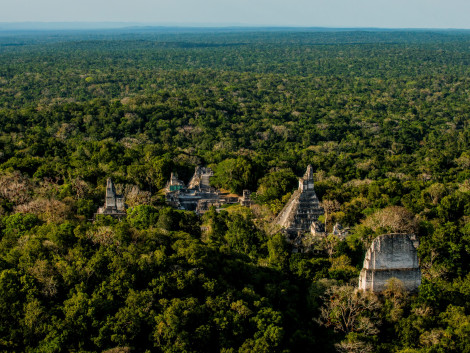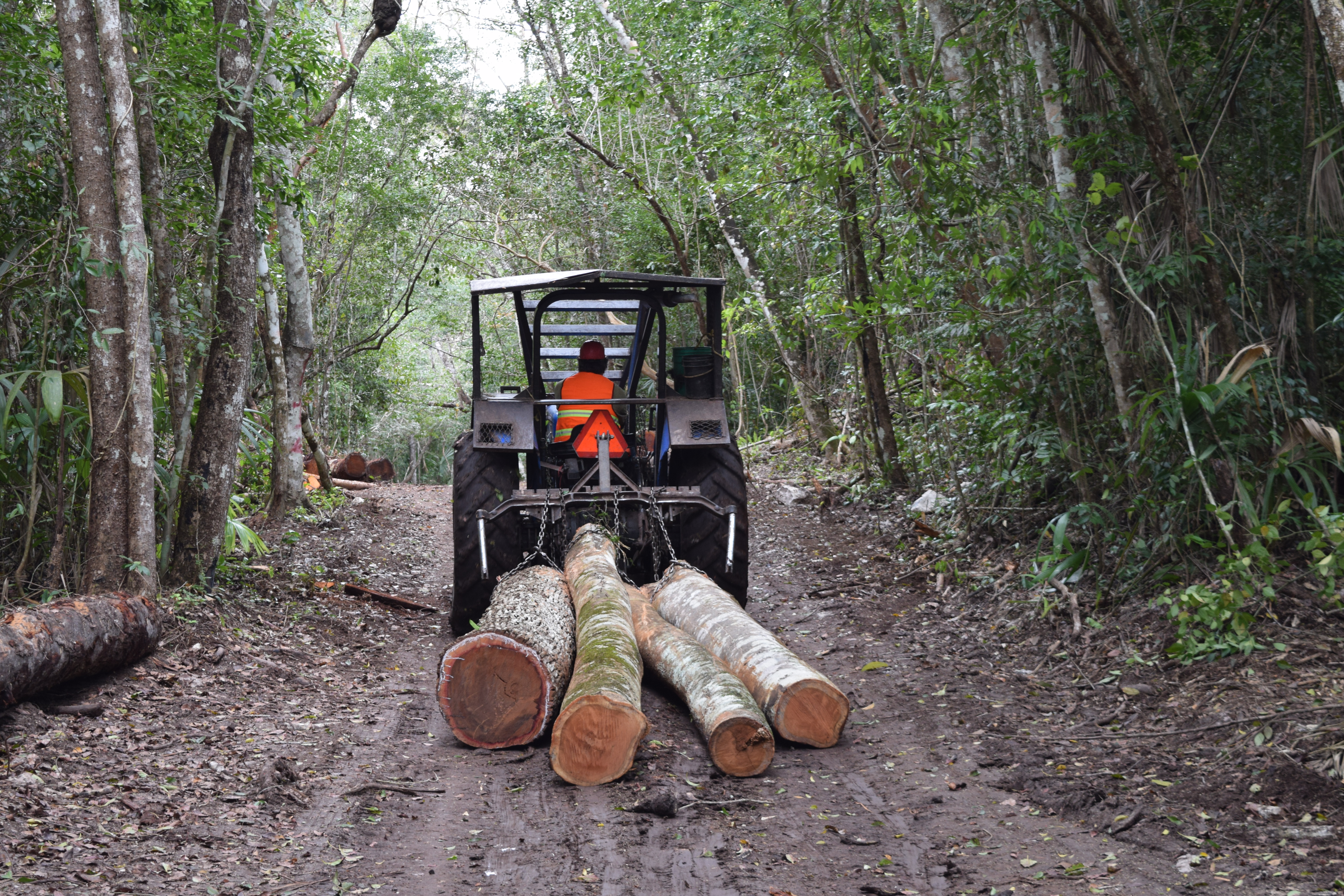

News | 12.05.2023
The Selva Maya tropical forest is the second largest forest north of the Amazon, covering the Maya Biosphere Reserve in Guatemala and much of the Yucatán Peninsula in Mexico. This critically important natural landscape is home to many Indigenous peoples, is the habitat of emblematic species like the jaguar and black howler monkey, and benefits the whole planet thanks to its ecosystem’s products and services. The Rainforest Alliance works to contribute to the environmental conservation of this forest, and to improve the living conditions of local communities.

A Proven Model for Communities and Forests to Thrive Together
Long experience has taught the Rainforest Alliance that local communities and Indigenous peoples play a valuable role in preserving forests—if given secured rights to land and resources, and when supported with technical capacities, incentives, and market access (cf. the Integrated Community Forest Management position paper). The many benefits of a rights-based approach are clear in countries with a long history of secured community forest rights, as seen within the Selva Maya on the Yucatán Peninsula and in the Maya Biosphere Reserve.
Visit the Selva Maya and See for Yourself
You can experience these benefits firsthand: As part of the joint efforts of the Rainforest Alliance and ATIBT, you are invited to participate in the Selva Maya Trade Mission to Mexico and Guatemala on June 14-26, 2023.
The trade mission will participate in the Selva Maya Tropical Timber Business Tulum Summit 2023, visit community forest concessions and enterprises on the Yucatán Peninsula and the Maya Biosphere Reserve, while experiencing beautiful natural and cultural sights throughout—and delicious food, of course. You can find more information about the full program here. We hope you can join us!
How Does This Model Work in the Field?
The Maya Biosphere Reserve is the last remnant of 2.1 million hectares of tropical forest in northern Guatemala. Decades-long civil conflict in the region—stemming, in part, from changes in land use and tenure—alongside a lack of community governance and administration left the forest increasingly vulnerable to wildfires, illegal logging, and other illicit activities.
After the peace Agreements were signed in 1996, Guatemala granted sustainable management rights to communities already based in the multiple-use zone in the Maya Biosphere Reserve. Since 2000, the Rainforest Alliance has collaborated with other organizations and lead initiatives to support the community forest management of the Reserve.
Currently, there are over 342 thousand hectares of community forest concessions certified under the Forest Stewardship Council (FSC). These concessions have a deforestation rate as low as 0.4 percent (versus 12 percent in nearby areas), and less than 2 percent of the fires in the entire Maya Biosphere Reserve occur in community concessions. Migration is unusual, and only two percent of local income comes from remittances.
After 25 years of proving their ability to comply with FSC certification standards, these communities have more than earned their honorary title of “the guardians of the forests”. As a result of their successes, in the last two years Guatemala granted two new community concessions and extended the contracts of eight others for 25 years.
Ejidos: Social Property in Mexico's Mayan Jungles
Forests cover one third of Mexico’s territory. Of these, more than 45 million hectares are managed under “ejidos”, which is communal land that follows a community forest management approach. Ejidos play an important role in the conservation of the Yucatán Peninsula’s biodiversity. They created ideal conditions for communities to embrace the sustainable use of natural resources, as ejidos provide a social, economic, and legal basis for common land management and community rights.
The Rainforest Alliance works with six ejidos managing more than two hundred thousand FSC-certified hectares. Within these ejidos, the Rainforest Alliance works to develop and strengthen production chains of community forest enterprises. The goal is to develop non-timber value chains, promote the diversification of livelihoods, and reduce outmigration of the next generation of forest guardians. The Rainforest Alliance works in many public/private collaborations to create job opportunities for locals and to support them in developing forestry-related skills. So far more than 120 young community leaders have participated in the “Our Forest, Our Future Program”, and six of them have received full scholarships to study in Costa Rica.
Such efforts don’t go unnoticed: In October 2022, the FSC recognized Noh Bec, Caoba and Nuevo Becal at their FSC Leadership Awards for these ejidos’ excellence in responsible forest management and conservation.
 Mexico - Rainforest Alliance
Mexico - Rainforest Alliance
Successes and Challenges
In both Mexico and Guatemala, most of these community organizations where the Rainforest Alliance works have developed better technical, organizational and market capacities than 20 years ago. They are now prepared to access more responsible markets and maintain sustainability. Although innovation and product diversification is still necessary, goods from these communities in Guatemala are already being exported to the United States. So, what is needed to build on that to enable sustainable growth and future success?
Listening to what ejidos and forest communities themselves identify as needs and challenges barriers helps the Rainforest Alliance to deliver the right support necessary for them thrive. A major barrier for ejidos, for example, has been their previous experiences with non-payment by buyers in other countries after products were delivered. Many ejidos now believe that selling locally, through intermediaries, is more secure. In doing so, however, quality and fair prices are sometimes sacrificed due to different requirements for local demand. Finding more responsible international companies and access to sustainable markets would support ejidos and forest communities in building trustworthy business relationships and securing better prices.
We hope you can join us in our work to create and strengthen such relationships, and that we’ll see you in the Selva Maya on our upcoming trade mission!